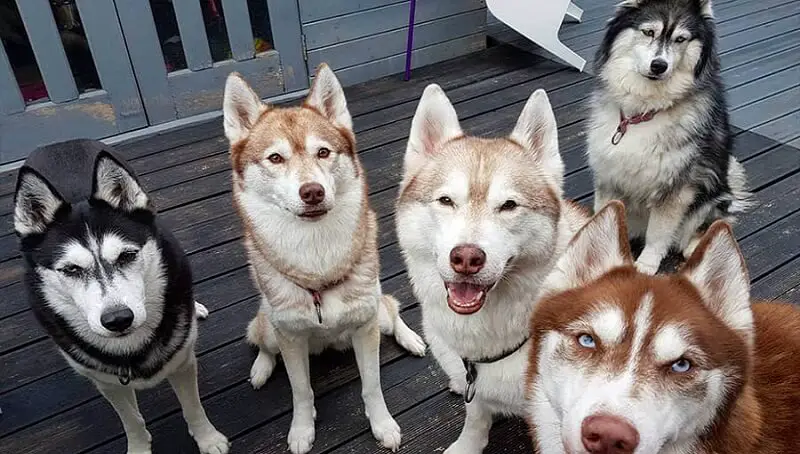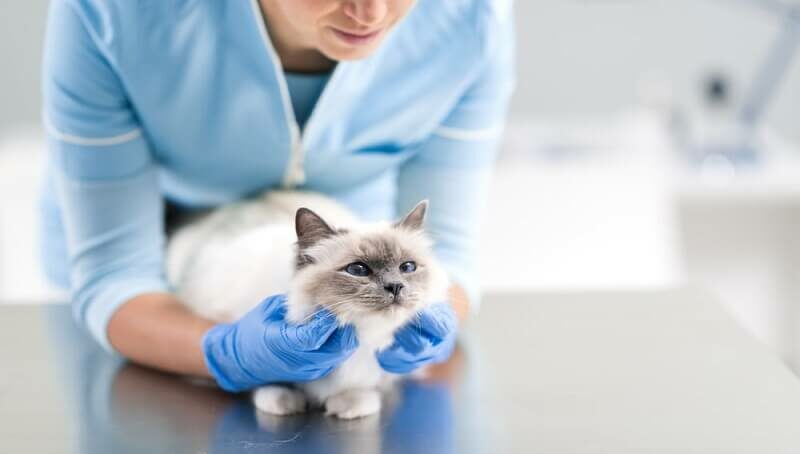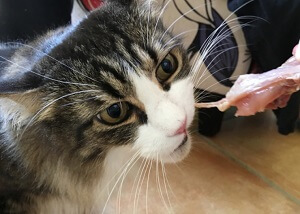
Incredible Donkey Facts
October 23, 2022
Common Husky Colors – from Agouti to Red
October 24, 2022
Most people have heard of taurine, especially when it comes to energy drinks. In this article, I will explain why taurine is very important for cats.
Taurine in the body of the cat
Taurine is a breakdown product of an amino acid from animal proteins. The correct term is aminoethyl sulphone acid. But for the sake of simplicity, many people, including me in the following article, call taurine an amino acid.
The cat’s body needs it for a functional metabolism, as well as for healthy digestion. As in dogs, a lack of taurine in cats can lead to dilated cardiomyopathy (DCM). This is a relatively rare disease in which the heart is strongly enlarged. How taurine works in detail is not completely clear, as many body functions influence each other. In any case, taurine helps regulate body temperature and supports the absorption of valuable fats from food. It is also important for the brain development of growing animals and can influence the sense of smell.
The need for taurine in cats
Unlike many other animals, cats cannot produce significant amounts of taurine on their own. They depend on your daily food supply, which is why taurine is one of the essential amino acids for them. Cats need up to 500 mg per day. Pregnant and lactating cats, as well as old cats, may need more.
In general, special cat food covers this requirement completely. Cases of taurine deficiency are rare and the causes are usually obvious. An example can be when the feline has long eaten dog food or supplement food. Cats that receive only vegan or vegetarian food are also at risk.
Symptoms of taurine deficiency in cats
If the cat does not receive food containing this amino acid, it will suffer from a deficiency in taurine. You won’t notice too quickly if your cat is suffering from a taurine deficiency. The first symptoms appear at the earliest after half a year, and in some cats even after a year. Among them are:
- Vision problems. Taurine is found in very large quantities in the cat’s retina, and without it, blindness can occur within two years.
- Heart problems. The heart muscle contains 50% of taurine from the total amino acids, and its lack leads to cardiovascular problems in cats, especially congestive heart failure.
- Reproductive problems. The deficiency of taurine in the cat’s diet leads to fertility disorders, reabsorption of the fetus, and the risk of miscarriage.
- Respiratory problems. Taurine contributes to a large extent to supporting immunity and its deficiency may promote the development of respiratory diseases.
- Digestive problems. Some studies link taurine deficiency to gastrointestinal problems in cats.
Taurine in nature
Fresh fillet, which includes the heart, has a very high proportion of taurine. The brain and liver are also rich in taurine. Cats that eat many mice on the loose cover their need for taurine. Rats also contain a lot of taurine. Plants do not contain taurine, but there is only one famous exception, the fig. It is unlikely that a cat will want to satisfy its need for taurine with this exotic plant. However, the amino acid is very sensitive to heat, which means that if you fry chicken hearts for the cat, you will destroy most of the valuable ingredients.
Taurine in dry and wet food
 Whether it’s fresh meat or dry or wet food, everything contains taurine. But depending on the presentation form, the cat’s body processes taurine differently. In addition, the natural taurine content of predators or farm animals may vary. When fed fresh meat, the cat generally receives enough taurine. The meat does not need to be heated.
Whether it’s fresh meat or dry or wet food, everything contains taurine. But depending on the presentation form, the cat’s body processes taurine differently. In addition, the natural taurine content of predators or farm animals may vary. When fed fresh meat, the cat generally receives enough taurine. The meat does not need to be heated.
You might also like my articles on:
- How much protein does a cat need
- What is a cat’s age in human years
- Whether cats can eat salmon skin
When it comes to dry and wet food, it is safest to choose a food with high meat content. But taurine content may also vary in this case. In addition to the variable taurine content in meat, another cause may be the different production methods. That is why many manufacturers add taurine directly to their feed and you can see it listed under the heading “additives”. Beware of overdose.
What is the amount of taurine a cat needs?
For commercial pet food, the minimum taurine requirement for adult cats is 25 mg/100 kcal of dry food and 50 mg/100 kcal for wet food, according to the Association of American feed Control. However, taurine requirements can vary from one cat to another, so it is always best to consult your veterinarian if you are concerned about the possibility that your cat will not get enough taurine.
Other vitamins and minerals a cat needs
Beyond taurine, to maintain proper health and vitality, cats also need other nutrients such as arginine, L-carnitine, essential fatty acids Omega-3 and Omega-6, vitamins, and minerals. A cat’s food needs are different depending on its age and health.
How to make sure your cat has enough taurine to keep them healthy:
You give her quality food. The cheaper versions of cat food, the colored food, are of inferior quality, because cereals and proteins of plant origin predominate, which do not cover the needs for taurine. Therefore, super premium food is recommended, which is a complete food, in which the protein of animal origin predominates.
Keep in mind that food prepared at home does not provide the necessary nutrients for proper nutrition.
Use, if necessary, taurine supplements, special milk for cats, and taurine-rich rewards, and it will be much easier and safer to avoid taurine deficiency.
Does your cat have a diet that provides enough taurine to be healthy?
Cats are the fur of balls that purr and are true companions. But a healthy cat is a happy cat and a perfect pet. For things to stay this way, it must be taken into account that it needs this dietary-supplemented amino acid. The myocardium and retina contain the highest concentrations of taurine, which is why a low level would lead to heart and vision problems.
